Best DDR3 RAM: 10 memory kits reviewed and rated
The best DDR3 memory kits revealed
Corsair Vengence 16GB
Model number: CMZ16GX3M4X1866C9R
Price: £105
Configuration: Quad-channel 16GB kit
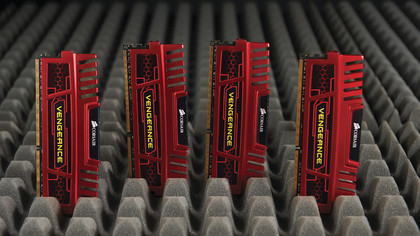
Life as a memory vendor is a pointedly precarious existence. Take Corsair: its Low Profile Vengence kit takes top honours in the dual-channel category while this quad-channel effort is relegated to also-ran status. If we're honest, there's not all that much between them. They are both good kits.
So what keeps the Vengence 16GB from top spot? It's certainly not bandwidth. With a claimed and tested 1,866MHz on offer, there's plenty of that. It cranks out some solid numbers in most of our benchmarks, too.
What it isn't is terribly consistent. At the default 1,333MHz setting, you get an impressive average of 114 frames per second in World in Conflict, for instance. that's the highest figure achieved by any kit, but the problem is the minimum frame rate was 50, which is middle of the pack. Arguably, it's minimums and not averages that count.
Making matters marginally worse, the average frame rate dropped when we upped the ante to 1,866MHz while the minimum didn't budge.
To be fair, this isn't the only kit that served up some slower numbers when running faster. At least in part, the results may reflect normal testing fluctuations, but the inconsistent performance certainly doesn't help the Vengence's cause.
Too inconsistent
Nor do latencies that are a little off the pace of the best. There's nothing wrong with 9, 8, 7, 20. It's very good - it's just that a few of the quad-channel kits do better, and the Patriot Xtreme is cheaper.
Sign up for breaking news, reviews, opinion, top tech deals, and more.
Similarly, we're not impressed by the fancy heat spreaders with tall fins, as they only get in the way of your CPU cooler.
Verdict: 3.5/5
Crucial Ballistix 16GB
Model number: BLE2CP8G3D1869DE1TX0CEU
Price: £165
Configuration: Dual-channel 16GB kit
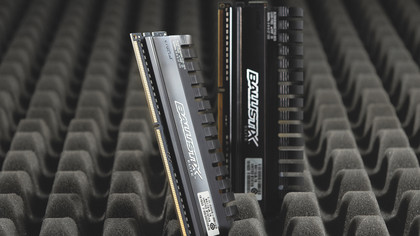
Less than £40 will see you loaded up with 8GB of perfectly tolerable DDR3 memory for your dual-channel rig. How, then, to justify this painfully pricey 16GB kit from memory specialists Crucial?
For a very small minority of high-performance PC users, the extra 8GB can make all the difference. Let's say you routinely have scores of ultra-high resolution images open in an editing package. At some point, you're going to run up against the limitations of 8GB. That's when the operating system will begin to transfer application data to disk or drive, and that's when system performance can get a bit smelly.
How much!?
But let's be clear, with 8GB that's hardly ever going to happen. The benefit of stepping up to 16GB is nothing like as significant as the leap from 4GB to 8GB. It's very much a case of receiving diminishing returns.
That's a real problem for this Crucial Ballistix kit, because the density required to achieve 16GB in just two memory DIMMs pushes the price well beyond double an equivalent 8GB kit. In that context, the main advantage of this 16GB two-stick solution over, say, a couple of 8GB kits or a quad-channel kit for £50 to £60 less, is restricted to stability and compatibility. When it comes to things like overclocking, two sticks tend to work better than one.
Capacities aside then, what's the actual performance like? Most impressive are the 9, 9, 9, 27 latencies when running at 1,866MHz. Overall performance in our suite of benchmarks is pretty solid too, but that £165 price tag still weighs too heavy.
Verdict: 3/5
G.Skill RipjawsZ 16GB
Model number: F3-12800CL9Q-16GBXL
Price: £85
Configuration: Quad-channel 16GB kit
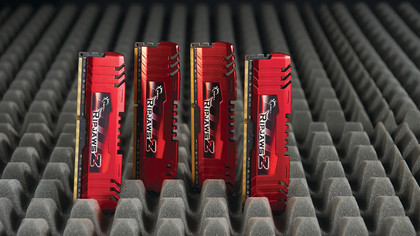
Unlike the dual-channel category where we'd frankly run a mile from Transcend's aXeRam 2000+ kit, there are no stinkers in the quad-channel category. You'd do just fine with any of the kits tested this month. That includes the G.skill RipjawsZ.
This kit would pass the Pepsi challenge with flying colours. If we lined up two otherwise identical PCs, one with the RipjawsZ and one with our test-topping kingston Hyperx kit, it would take some kind of modern-age hardware guru to feel the difference. Frankly, we'd suspect foul play if anyone could.
But there are still reasons to differentiate, both notional and tangible. The RipjawsZ is a little off the pace wherever you look. Its 9, 8, 8, 20 latencies at 1,333MHz are good, but not spectacular. Its 1,600MHz top speed is similarly useful, but hardly world-beating when you realise the Hyperx hits 2,133MHz. The benchmark numbers it cranks out are entirely acceptable, but bettered elsewhere.
Lose the fins
On a more tangible note, these are nicely engineered DIMMs with great looking, albeit tall finned, heat spreaders. If RAM cooling was a major issue that might be an interesting trade off in terms of cooling and system configuration, but it isn't, so there's little to be gained fouling the CPU socket and preventing certain makes and models of CPU coolers from being used.
Lower profile heat spreaders make more sense in today's systems where overclocking is done by dividers. But like we said, this kit is no dud. It's great value at £85. It just loses out in a game of very tight margins.
Verdict: 4/5
G.Skill Ares 8GB
Model number: GS-F3-2133C9D-8GAB
Price: £70
Configuration: Dual-channel 8GB kit
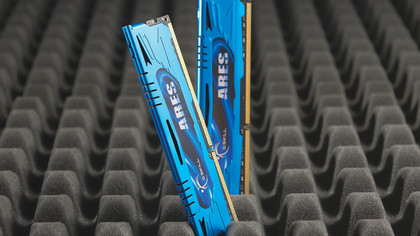
When you compare CPUs or graphics cards, the results usually make sense. Some cards and chips are clearly faster than others, and the reasons are fundamentally fathomable. Would that it were so with system memory.
Instead, all sorts of strange things happen, especially when you start mucking about with frequencies and timings. The G.Skill Ares 8GB kit is a classic example.
Oddball benches
It posts some inexplicably low numbers in our World in Conflict benchmark when running at 1,333MHz. we gave it a couple of extra runs to get its act together. The 6.77pts produced in Cinebench 11.5 is bottom-rung material, too.
Part of the explanation might be the timings: 8, 10, 9, 26 at 1,333MHz is a bit odd. Things do pick up a bit when you start cranking up the clocks, though. G.Skill claims 2,133MHz is on offer and we achieved just that, and also matched the quoted 9, 11, 10, 28 latencies at that much higher frequency. Those are decent numbers for such a high clockspeed. Only the dual-channel Kingston HyperX 8GB kit can match that frequency while achieving better timings.
At 2,133MHz, the average and minimum frame rates scale up from 97 and 42 to 103 and 49. That's better, but it's still not as many frames as Corsair's Vengence Low profile kit cranks out at 1,333MHz. Like we said, memory can be a bit odd.
Still, at least we're fans of G.Skill's low-profile heat spreaders. Fancy fins are all very well, but when they clutter up the CPU socket you'll quickly remember they're mostly for show.
Verdict: 3.5/5
Kingston HyperX 8GB
Model number: KHX1866C9D3T1K2/8GX
Price: £55
Configuration: Dual-channel 8GB kit
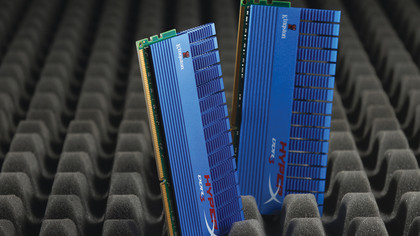
Transcend will do you a decent 8GB kit that gets the job done just fine for £35. Why push another £20 Kingston's way?
For starters, Kingston would no doubt argue, you're getting much better build quality. Where the Transcend effort cuts a pointedly threadbare dash, Kingston has suited and booted this HyperX kit in the latest anodised alloy accoutrements. By that we mean hefty heat spreads.
Tthe problem is, we're not convinced they're really necessary. Moreover, the only thing we're sure about is that the tall cooling fins can get in the way of some CPU coolers on most motherboards. We're not against heat spreaders per se, but we definitely prefer the low profile variety with today's low-voltage memory.
On the upside, this Kingston kit comfortably out stripped its quoted top frequency, delivering 2,133MHz with the same 9, 11, 9, 27 latencies claimed for 1,866MHz. Unfortunately, raw bandwidth aside, going beyond 2GHz doesn't translate into significantly better performance in several of our benchmarks.
The Cinebench score, for instance, edges up from 6.88pts to just 6.89pts, which is distinctly unexciting.
Hyper-Ex
Okay, the average frame rate in World in Conflict stepped up from 98 frames per second to 106, but the minimum rate increased by a solitary frame. Similarly, at the default 1,333MHz frequency, latencies of 9, 9, 9, 24 are nothing special, and neither were the performance results.
It's not easy being a premium memory kit, we're happy to admit. Like so many others, this one is good but not quite great.
Verdict: 3.5/5
Technology and cars. Increasingly the twain shall meet. Which is handy, because Jeremy (Twitter) is addicted to both. Long-time tech journalist, former editor of iCar magazine and incumbent car guru for T3 magazine, Jeremy reckons in-car technology is about to go thermonuclear. No, not exploding cars. That would be silly. And dangerous. But rather an explosive period of unprecedented innovation. Enjoy the ride.